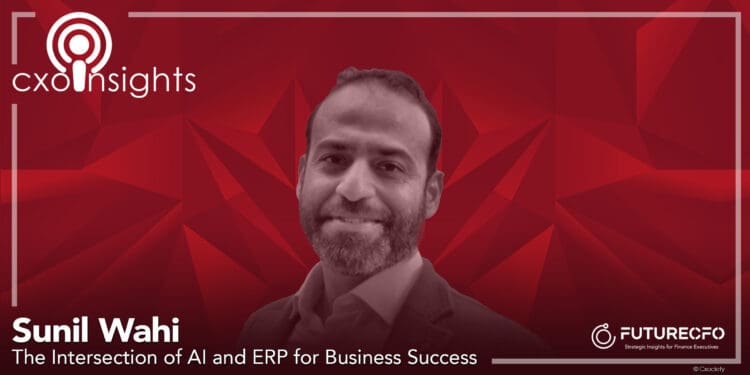The convergence of AI and ERP offers the potential to overcome traditional barriers to efficiency and accuracy in financial management, enabling Asian companies to compete more effectively on a global scale.
AI-powered ERP systems can help address regional challenges such as complex regulatory environments, diverse currencies, and rapidly changing market conditions by providing more agile and responsive financial tools.
However, challenges such as data security concerns, the need for specialised AI talent, and cultural adaptation to AI-driven decision-making processes may require careful navigation.
Gartner says the uptick in AI-enabled ERP capabilities coupled with the strengthening of composable ERP strategies creates opportunities to deliver additional value. The analyst further suggests that application leaders must understand the technologies and frameworks that underpin a composable approach to set the scene for AI-enabled wins.
Concurring with this assessment, Sunil Wahi, vice president of APAC solution engineering, applications at Oracle, says there is strong potential for AI to be leveraged in different use cases to help draw insights and make businesses more compliant and efficient.
“For example, AI automates risk management and cash forecasting processes using machine learning to generate more accurate and timely predictions,” he elaborates. “Furthermore, machine learning continuously adapts to new data, which can enhance the precision of forecasts and provide CFOs with a better view of the entire business process, all made possible by the agility of the cloud.”
Seamless integration of AI into the current Tech stack
However, even as more organisations, 57% according to a Spiceworks and Aberdeen Strategy & Research study, are planning to bring AI into the workflow, the issue will be whether such a move will simplify or add further complexity to the existing IT stack.
Wahi argues that in the age of agile technology where AI is embedded in solutions, CFOs no longer need to worry about massive overhauls to adopt AI-driven solutions. He adds that the cloud facilitates these integrations by incorporating AI without requiring licensed large language models.

“We also aim to make technology as transparent as possible, so businesses do not need to worry about adding new types of technology on top of what they have running in the background." Sunil Wahi
Enhance business resilience through AI-driven planning
With uncertainty the only constant these days, finance functions can significantly enhance organisational resilience against regional disruptions by employing advanced AI-driven planning and forecasting tools. These tools enable finance teams to simulate various scenarios, assess potential impacts, and develop contingency plans.
Wahi cautions that when adopting a vendor's cloud applications, the responsibility often falls to the third party. “At Oracle, we run our applications on a single Oracle Cloud Infrastructure that offers enterprise-grade security,” he adds. “Through AI-driven planning, we have transformed our business stance against disruptions to be more proactive. This approach gives us better visibility and agility, enabling us to make robust decisions and convert potential concerns into actionable steps driven by AI.”
Addressing skills gaps and cultural challenges
Finance modernisation reveals the prevailing skills gap and cultural challenges for many organisations. While the entry of millennials and Gen Y into the labour force may eventually solve some of these issues, the prevailing skills gap is only going to worsen in the short-term as are cultural challenges that come when five generations, Gen Z, millennial, Gen X, Baby Boomers and Silent Generation, share the same workplace.
Wahi believes that it is important to design systems that are intuitive and user-friendly. He notes that in today’s world, users are used to interacting with platforms like Facebook and Instagram, so they expect the same user experience when using enterprise-grade applications.
He points to Oracle’s investments in intuitive applications through its Redwood strategy, where the company aims to create simpler applications that users can interact with to boost their adoption and ease the transition.
Compliance with regional regulations
As organisations leverage AI for financial reporting and risk management, it is imperative to ensure compliance with varying regional regulations. Finance teams should establish a framework that incorporates regulatory requirements into their AI systems, utilising automated compliance checks and reporting tools.
Wahi suggests that organisations prioritise the alignment with local compliance requirements. He suggests making sure that industry partnerships that facilitate cloud adoption in different countries comply with prevailing regulations.
“Similarly, the same practice of governance structure and access privileges should be embedded within business strategies, ensuring that only relevant users are allowed access,” he continues.
Optimising supply chain and procurement processes
The pandemic has opened enterprises and governments to the vulnerability of a connected supply chain. For CFOs, one other eye-opener is the recognition that much still needs to be done not only to ensure supply chain resilience but modernise processes to ensure optimum performance.
Wahi believes that AI will allow organisations to visualise the entire supply chain better and gain insights into delays and expected timelines. Leaders can leverage this information to readjust the supply chain network based on AI-driven analytics.
“Beyond that, AI can also recommend the best supply chain route and provide a projected overview after analysing all the variables within the network. This overview is useful in helping inform managers what corrective actions they can take to manage the risk,” he elaborates.
Maximising ROI from AI-ERP investments
Cloud adoption has reawakened the discussion around return on investment (ROI). FutureCFO expects that any theme in 2025 will have ROI as part of the discussions at the beginning, middle and end of the investment cycle.
Despite the interest and euphoria around AI, the technology will not be exempt from any ROI scrutiny.
Wahi says to maximise ROI, leaders must be clear about their goals before pursuing AI solutions. “There are plenty of use cases for AI and understanding what and how to maximise impact will be most important,” he asserts.
“The speed of innovation will result in new AI solutions coming out every quarter, and this will not stop. However, we must stay focused on business outcomes to help guide our approach to AI and look beyond the hype.” Sunil Wahi
Conclusion
FutureCFO believes that the intersection of AI and ERP systems offers a pathway to business success in the complex and rapidly evolving Asian markets. By leveraging AI-driven insights, ensuring data integrity, enhancing resilience, addressing skills gaps, maintaining compliance, optimising processes, and maximising ROI, organisations can position themselves for sustained growth and competitive advantage.
As the AI landscape continues to evolve, the potential for transformative impact on ERP systems will only increase, making this integration not just a strategic choice, but a necessity for future success.
Click on the PodChats player to hear Wahi’s views on the intersection of AI and ERP for business success.
- How can the finance function leverage AI-driven cloud ERP tools to provide timely, strategic insights that drive accurate decision-making in the rapidly evolving Asian markets?
- How can we ensure the seamless integration of analytics, machine learning, and AI into the organisation's core technology stack while maintaining data integrity and security?
- In what ways can finance enhance the organisation’s business resilience against regional disruptions through advanced AI-driven planning and forecasting?
- How can finance address the skills gap and cultural challenges associated with implementing AI-powered financial systems in our diverse Asian workforce?
- What measures should finance take to ensure compliance with varying regional regulations while leveraging AI for financial reporting and risk management?
- How can finance optimise current supply chain and procurement processes using AI-ERP integration, considering the complexities of Asian markets and trade relationships?
- What strategies can finance employ to maximise the ROI of our AI-ERP investments?




